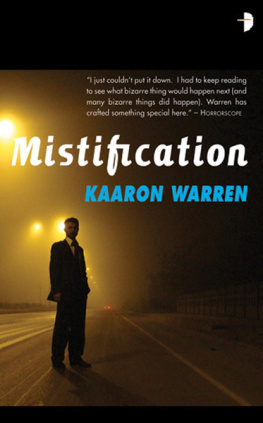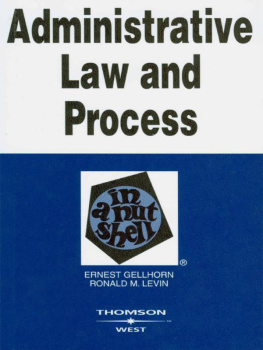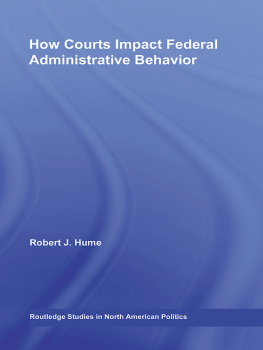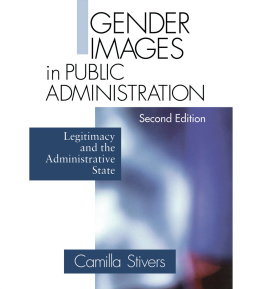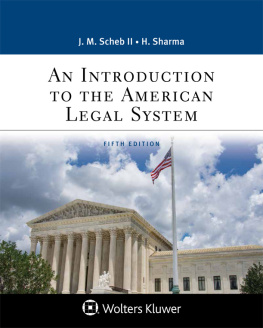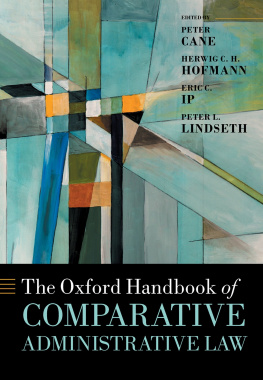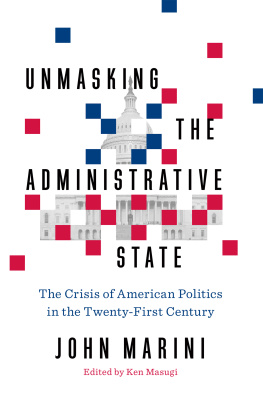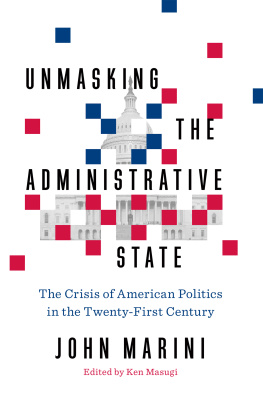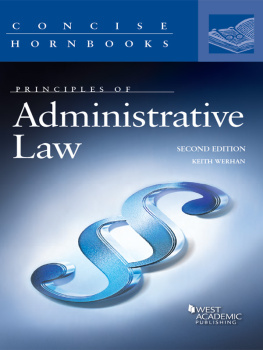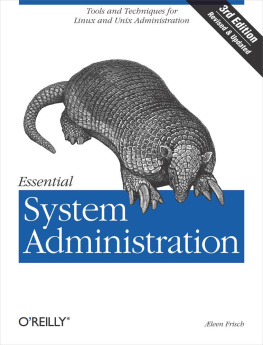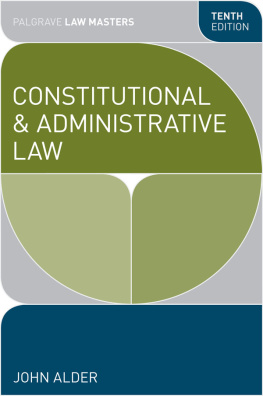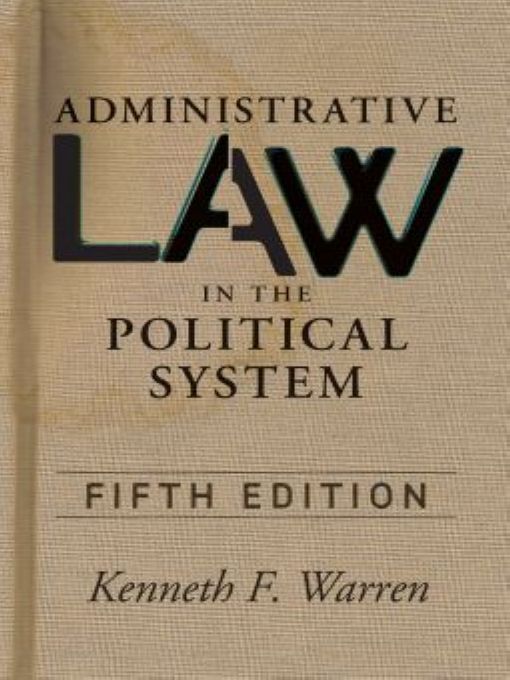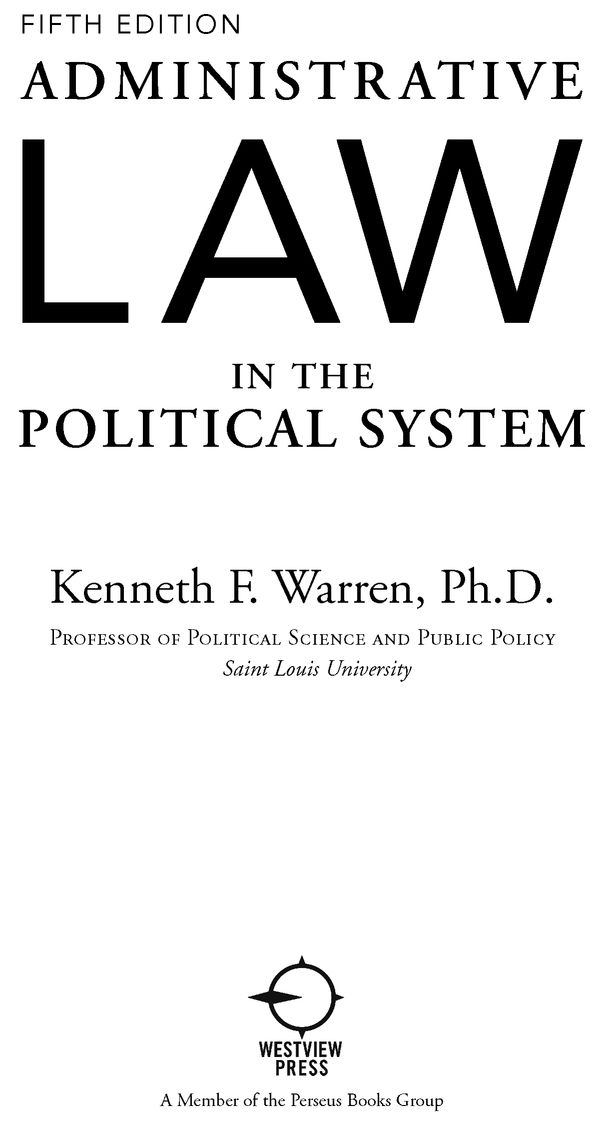Table of Contents
To those who provide love and joy to my life, Tao, Heidi, Megan, Emily, and Jeremy and To all those who struggle to achieve procedural due process
Preface
Administrative Law in the Political System, fifth edition, represents an attempt to satisfy a need in the public administration field for a comprehensive yet streamlined administrative law text written by a social scientist especially for social science students, although the book is certainly appropriate for law students. The general purpose of the book is to convey to students the role of administrative law in the American political system and, more specifically, its role in guiding and restricting the actions of administrative agencies to make regulatory practices in line with due process standards. The book is unique in that all traditional administrative law topics covered (e.g., rulemaking, adjudication, tort law) are written as much as possible in nontechnical language, with an emphasis on points of special interest to social science students, particularly those in political science, public administration, and public policy. Special attention is given to the impact politics has on efforts by administrators to comply with administrative law dictates. Systems theory is employed in a limited manner to stress that agency regulators must respond not only to the demands placed on them by administrative law, but to the conflicting socioeconomic, political pressures stemming from their total environment.
An enormous effort has been made to make this fifth edition as up-to-date as possible. Emphasis has been placed on current trends in administrative law, recent court decisions, and events during President Barack Obamas administration that have influenced the development of administrative law. Also examined is how the post-9/11 mindset, neoconservative politics, and the neofederalism revival of the Eleventh Amendment have changed the tone of administrative law today.
In sum, this new edition should be appreciated especially by social science students, particularly in the area of public administration, because it (1) provides comprehensive yet streamlined coverage of administrative law written especially for social science students; (2) does not assume prior legal training or command of a technical legal vocabulary; (3) draws on both the legal and the social science literature to help provide insights into the nature of administrative law; (4) plays down the case approach, although hundreds of cases are covered, in favor of a more direct descriptive and analytical approach, which makes the relatively difficult subject matter of administrative law considerably easier to understand; (5) employs systems analysis, a popular analytical framework, to place administrative law in the perspective of the American political system; (6) relates administrative law to public policy concerns; and (7) is quite current, covering administrative law developments during the Obama administration.
I do not want to forget the help I have received over the years for all of the editions of my book, so I will continue to acknowledge them. I want to thank the following people for their technical assistance, research assistance, scholarly insights, and just plain emotional support and encouragement: David Rosenbloom, John Rohr, Rosemary OLeary, Jay Shafritz, Missouri Supreme Court Justice Mike Wolff, administrative law judge Joe Simeone, Kevin Horrigan, Tim Bagwell, Steve Puro, Tim Lomperis, Charles Kofron, Craig Fitzpatrick, Alan Lamberg, John Olsen, Peter Hovey, Steve Catalano, the late George Wendel, and one of the greatest administrative law scholars for his continued support before his death, Bernard Schwartz. In particular, I want to single out and thank Phyllis Forchee, my secretary, for her dedicated efforts in helping to put this lengthy book into its final form; John Montre, reference librarian at Saint Louis University, for helping me with my enormous research for this book; the cartoonists, Tom Engelhardt, John Sherffius, RJ Matson, and Daniel Pearlmutter, whose cartoons have added needed comic relief to the serious subject of administrative law; my editor at Westview Press, Anthony Wahl, who has competently guided me through this fifth edition, as well as Meredith Smith, project editor, and Beth Wright, copyeditor, who have competently made valuable edits to this book. Special thanks goes to Tao Jiang for her understanding and loving support.
Naturally I want to thank my students at Saint Louis University as well as the students I taught at Vaxjo University in Sweden, Maastricht Center for Transatlantic Studies in the Netherlands, and Oxford University in Britain. These students all provided me with valuable feedback on my book. I also want to extend my special thanks to Wang Conghu, who competently translated my book Administrative Law in the Political System into Chinese, thus allowing it to be read widely by Chinese students and scholars. Additionally, I want to thank the administrators and faculty at Renmin University of China in Beijing, Xiamen University, and the City University of Hong Kong for giving me the opportunity to lecture to students and faculty at these fine universities. The Chinese students were a particular delight to teach because they love to learn and they are particularly interested in American administrative law.
KENNETH F. WARREN
St. Louis, Missouri
Spring 2010
Chapter 1
ADMINISTRATIVE LAW
An Introduction
OBJECTIVES OF THIS BOOK
Almost three decades ago the first edition of this book was written to fill a conspicuous void in the literature on public administration and public policy. Up to that time no comprehensive administrative law textbook had been written by a social scientist for social science students, despite its basic relevance to the field. Fortunately, since that time several other social scientists have written administrative law textbooks specifically geared for social science students, thus helping to fill that conspicuous void.
All comprehensive administrative law textbooks up until the 1980s had been written by law professors (for example, Kenneth Culp Davis, Walter Gellhorn and Clark Byse, and Bernard Schwartz) who rarely treated in any depth the relevant public policy issues quite obviously implied by administrative law questions. This is not to suggest that these writers did not on occasion entertain important policy questions. Daviss Discretionary Justice and Gellhorns When Americans Complain are two excellent examples of specialized works in which the authors transcended mere technical discussion of administrative law doctrines and searched for solutions to related and obstinate public policy problems. Consequently, these particular books were widely used in the past by social scientists.
However, even a cursory inspection of these pre-1980s administrative law texts conveyed very clearly that they were only intended for law school students. The prose reflected the technical legal language of the authors. These authors were not attempting to motivate their readers to think about vital public policy questions in our society; rather, they were chiefly concerned with trying to teach students how to win administrative law cases. Why, for instance, did so many of their problem-oriented discussions end with the traditional legal casework rhetoric: What judgment? While public administration students are somewhat interested in the what judgment controversies, they are more concerned with administrative law issues pertaining to important public policy questions. For example, what regulatory procedures are employed by the Department of Homeland Security (DHS) or the Securities Exchange Commission (SEC) when those agencies make rules and conduct hearings? And how do these regulatory procedures affect the DHSs ability to prevent, for example, another 9/11 attack on the United States or the SECs ability to prevent another Wall Street collapse?




